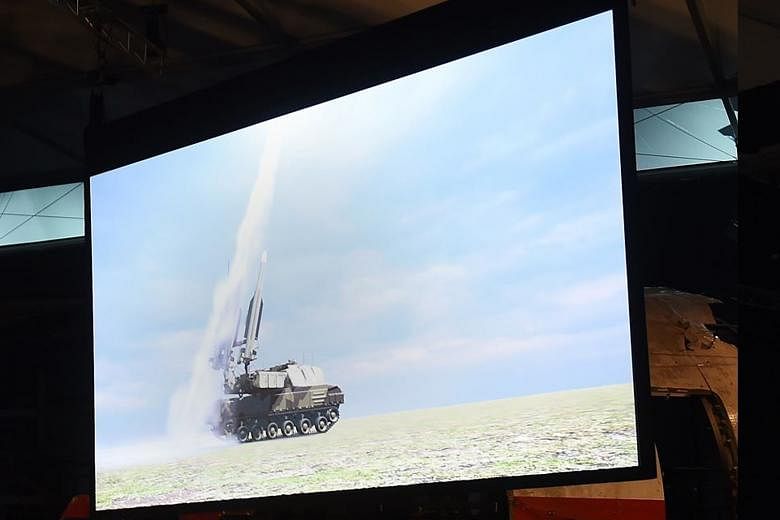Russia has rejected demands from Western governments to set up an international tribunal to prosecute those responsible for the destruction of Malaysia Airlines Flight MH17 in July last year.
But the release of an exhaustive report into the crash, which killed 298 people, has proven beyond reasonable doubt that the airliner was brought down in the airspace over neighbouring Ukraine by a Russian-made surface-to-air missile. And, although that did not prevent Russian Deputy Foreign Minister Sergei Ryabkov from dismissing the authors of the report as "biased from the start", the accumulation of evidence about the destruction of MH17 is beginning to severely restrict Russia's ability to shake off any legal responsibility for the disaster.
In the weeks immediately following the downing of the MH17 aircraft last year, sources within Russia have circulated a multitude of theories about who the culprits may be. Some of these were zany conspiracy plots, such as the allegation that the MH17 flight was, in fact, unmanned - that it took off from the Dutch airport of Amsterdam at midday on July 17, 2014, stuffed with dead bodies and that it was pre-programmed to destruct over the skies of Ukraine in order to discredit Russia.
However, other theories were designed to sound more plausible, and were initially promoted by Russian officials, as well as by Russia's state-controlled media. These included allegations that MH17 was brought down by the Ukrainians themselves because the colours of its fuselage supposedly resembled those of the private jet of Russian President Vladimir Putin; that MH17 was shot down by Western military aircraft; or that the plane was torn apart by an onboard explosive device placed by a "terrorist network".
Each one of these allegations was supposedly accompanied by documentary evidence which mysteriously never materialised.
The 300-page report compiled by the Dutch Safety Board and released on Tuesday has now comprehensively eliminated all such conspiracy theories.
Based on structural damage to the fuselage of the plane, the shape of the fragments of the projectile embedded in the wreckage as well as remains of a missile nozzle and cables belonging to the stabilising mechanism of the explosive which hit the plane, investigators established beyond any reasonable doubt that MH17 was destroyed by a BUK surface-to-air missile produced by Russia.
"The impact pattern could not have been caused by a meteor, an air-to-air missile or an internal explosion," Dr Djibbe Joustra, who heads the Dutch Safety Board, said.
Anticipating such an outcome, Russian officials who deal with the case have tacitly discarded alternative explanations and have recently accepted that one of their BUK missiles was responsible for MH17's destruction. But they have alleged that the version of the missile which hit the plane was from an older batch of missiles no longer used by the Russian armed forces, although it continues to be in the inventories of the Ukraine military.
Moscow also complained this week that Dutch investigators had failed to take into account evidence provided by the BUK missile manufacturers, which supposedly proves this point.
In theory, this technical dispute works in Moscow's favour: The argument now is about the shape of the shrapnel fragments, with Dutch investigators claiming that these are of a "bow tie" variety produced by newer versions of the BUK missile, and Russians claiming that they resemble the shape of the pear, usually produced by older missile versions. That is the sort of technical detail the broader international public is unlikely to remember, and one which gives Russia at least plausible deniability.
Russia can also successfully continue to deny any legal liability. It recently vetoed a United Nations Security Council resolution, sought by Malaysia, Ukraine, the Netherlands, Australia, and Belgium, to establish a criminal tribunal to prosecute those responsible for downing the Malaysian airliner.
Yet, matters are unlikely to rest here, for a separate Dutch-led investigation into the criminal responsibility for the destruction of the Malaysian aircraft is scheduled to report early next year.
Dutch officials have not denied rumours that Western intelligence agencies, and particularly those of the United States, may declassify some of their satellite imagery of the tragedy. Either way, demands for the establishment of a tribunal will intensify.
And then, there are other pending legal cases against the Russian state and its officials.
Britain has launched a new inquest into the November 2006 murder of Mr Alexander Litvinenko, a former Russian state security officer who had become a British citizen.
The European Parliament is calling for an independent international investigation of the murder of the Russian opposition political leader Boris Nemtsov. And Russia faces an international legal refusal to recognise its annexation of Crimea.
For the moment, Mr Putin seems content to ignore all these challenges. But, sooner or later, Russia's diminished international reputation will end up inflicting real damage on the country and its government.





